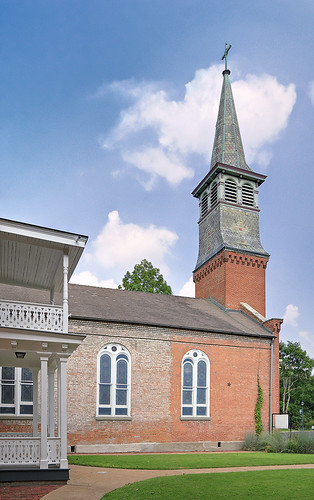
The shrine was the home of Saint Duchesne in the years 1819-1827 and 1834-1840; earlier, she had started a school for girls in nearby Saint Charles, Missouri.
The church's cornerstone was built in 1819-1821, and is one of the oldest churches in this part of the country.
Click here for other photos of the church taken the same day.
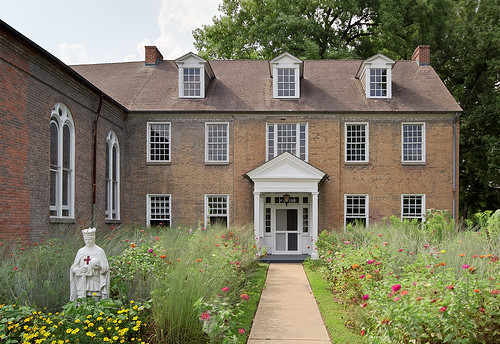
The convent, constructed under the supervision of Mother Duchesne, dates from 1819, and is an excellently preserved example of the Federal style.
Saint Rose Philippine Duchesne was born on 29 August 1769 at Grenoble, France, and became a member of the Visitation at age 19, against the opposition of her parents. Her religious order was violently disbanded under the Reign of Terror; after this ended, she joined the Society of the Sacred Heart under under Saint Madeline Sophie Barat. At age 49, Mother Duchesne came to the Louisiana Territory of the United States, settling in the Saint Louis area, where she met with much failure and disappointment.
Describing this difficult life she wrote, “Poverty and Christian heroism are here, and trials are the riches of priests in this land.”
"Everything in and about her was stamped with the seal of a crucified life."
Mother Duchesne, writing about the Potawatomi:
Mother Duchesne would keep all-night vigils in the chapel, on her knees in prayer. The Potawatomi called her Quah-kah-Ka-num-ad — “Woman Who Prays Always”.

The convent, constructed under the supervision of Mother Duchesne, dates from 1819, and is an excellently preserved example of the Federal style.
Saint Rose Philippine Duchesne was born on 29 August 1769 at Grenoble, France, and became a member of the Visitation at age 19, against the opposition of her parents. Her religious order was violently disbanded under the Reign of Terror; after this ended, she joined the Society of the Sacred Heart under under Saint Madeline Sophie Barat. At age 49, Mother Duchesne came to the Louisiana Territory of the United States, settling in the Saint Louis area, where she met with much failure and disappointment.
Describing this difficult life she wrote, “Poverty and Christian heroism are here, and trials are the riches of priests in this land.”
An older altar from the church is now located in the convent. ‘E.V.S.O.D.’ stands for Ego Vobiscum Sum Omnibus Diebus "I am with you all days" (Matthew 28:20).
The convent parlor.
Mother Duchesne never managed to master the English language, nor did she accept the lax customs of the Americans. Her formal, old-world style was reflected in her students: up until the 1960s, alumnae of Sacred Heart academies were known for a culture and refinement far exceeding their peers.
At a time when schooling was considered only important for wealthy boys, Mother Duchesne worked to provide an excellent education to girls of all classes and races.
Although she was cultured and refined, Mother Duchesne lived as did Saint Francis of Asissi, in extreme poverty; this fine but simple convent ought to contrasted with the shacks she often lived in. According the the Jesuit missionary Fr. DeSmet, “No greater saint ever died in Missouri or perhaps in the whole Union.”
Mother Duchesne's bedroom was this closet under the stairs, near the doorway into the church where she often kept vigil.
The faithful leave prayer petitions in the Saint's little bedroom.
The kitchen. A garden is behind the nearby rectory.
An office, with a portrait of the Saint above the fireplace.
From an early age, the Saint wanted to evangelize the Indians, but this desire was checked by need, and she remained obedient to her superior, Mother Barat, and to her Bishop.
But in 1837, the Potawatomi were expelled from Michigan and Indiana, and under the great hardship of the “Trail of Death”, were relocated to Kansas. The band and their priest, Fr. Benjamin Petit, were struck by typhoid fever, and soon these Catholics were in dire need of a shepherd. Mother Duchesne, dismayed by the poor treatment of the Indians by the government, pleaded to go on mission, even though she was at the age of 71. According to the Jesuit missionary Fr. Verhaegen, “She may not be able to do much work, but she will assure success to the mission by praying for us. Her very presence will draw down all manner of heavenly favors on the work.”
A room shown as an infirmary.
“There are no difficulties here except when people worry too much about tomorrow...
Once baptized, they never revert to drunkenness or stealing. Whatever is found is placed at the door of the church to be claimed by the owner. Not a single house has locks on the doors, yet nothing is ever missing. The Indians gather in groups (men and women separate) for morning prayers, Mass, and catechism. In the evening they assemble again for prayers.”
Sister's dormitory.
Mother Duchesne remained among the Potawatomi for only a year, and unlike the young Sisters, was unable to learn their language. Click here for a scanned Missal in the Potawatomi language.
The Lord's Prayer in the Potawatomi language:
Nosinan wakwig ebiyin, ape kitchitwawenitamag kitinosowin, kitokumawin ape piyamikuk, kitebwetako tipu wakwig, apeke ichu tebwetakon chote kig.
Ngom ekijikiwok michinag wamitchiyak, ponigitediwichinag kego kachikichiinakin, echi ponigitediwiket woye kego kachikichiimidjin; kinaimochinag ewi pwa patadiyak; tchitchiyikwan nenimowichinag meyanuk waotichkakoyakin.Ape iw nomikuk.
The other end of the dormitory.
Mother Duchesne would keep all-night vigils in the chapel, on her knees in prayer. The Potawatomi called her Quah-kah-Ka-num-ad — “Woman Who Prays Always”.
The garret is on the top floor.
Mother Duchesne met her heavenly reward on 18 November 1852, in Saint Charles, Missouri. Her final words were “I give you my heart, my soul, and my life, oh, yes, my life, generously.”
Her relics are entombed at the Shrine of Saint Rose Philippine Duchesne, in Saint Charles.
Her relics are entombed at the Shrine of Saint Rose Philippine Duchesne, in Saint Charles.
These photos were taken on August 31, 2008. My older photos of Old Saint Ferdinand Shrine are found here and here.

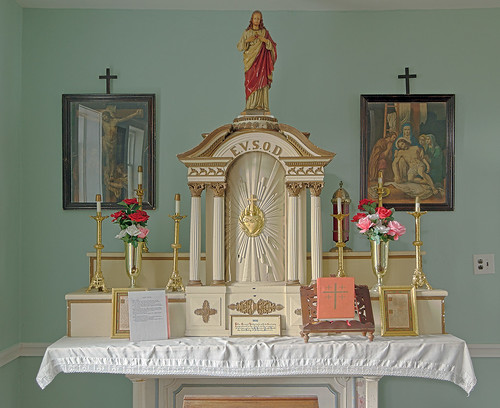
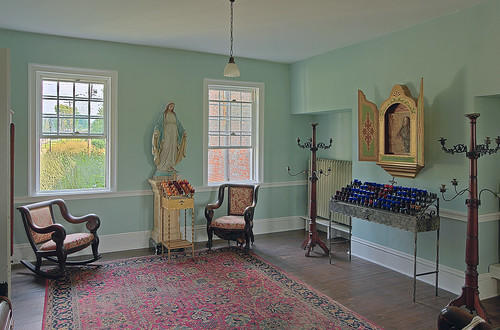

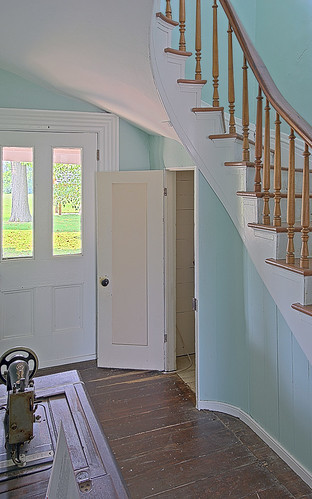
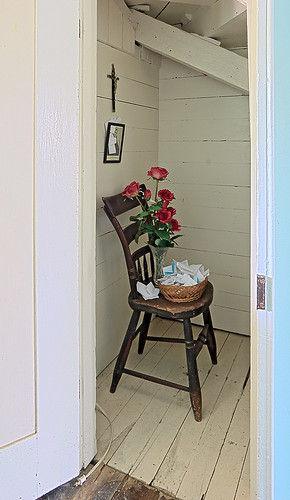
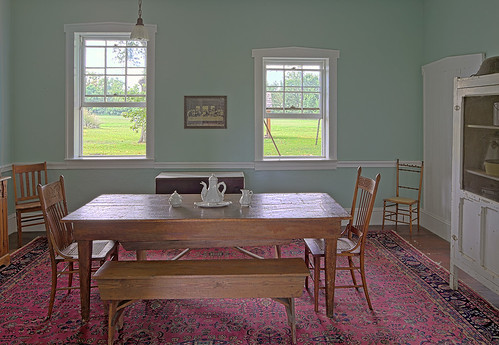
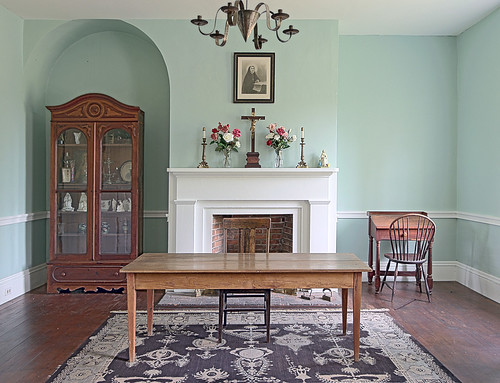
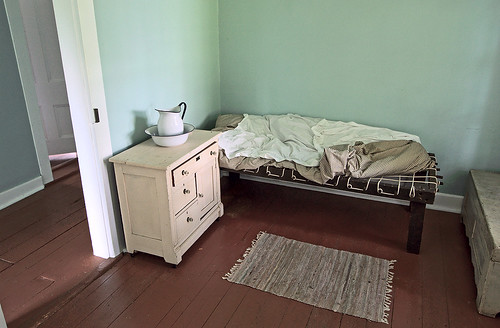

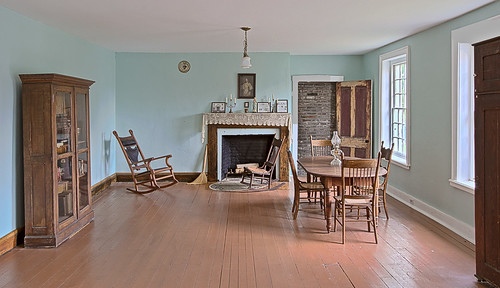
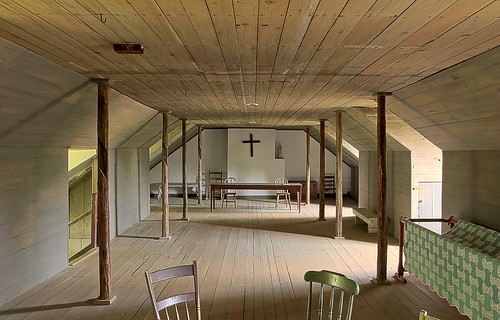
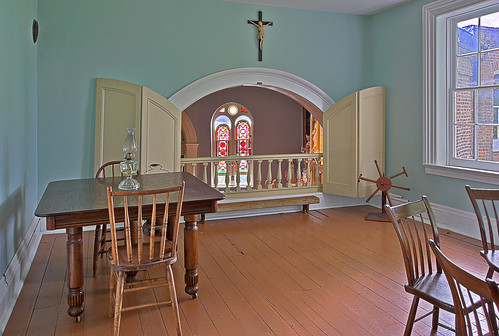

Thank you for posting such wonderful photos of the shrine. I lived here from 1988-2009 on the second floor of the Rectory. I lived and breathed the shine for many years and it was a great honor to have served here. I was very diligent in my care and I hope that this shows in the photographs.
ReplyDeleteOne other note if I may. Notice the gardens in all these pictures.They are my handiwork and i was very proud of them. I enhanced the beauty of the Shrine like no ther before me. I specialized in using native Missouri plant and grasses and mixing them with a generous drought resistant assortment of Zinnias. As you can see from the photos of the Convent this was spectacular. This all had many advantages and the first was beauty, the second was the reduction in time spent behind a lawnmower and thirdly there was an explosion of birds and other wildlife. Sadly this was all destroyed after i left in 2009.
Delete